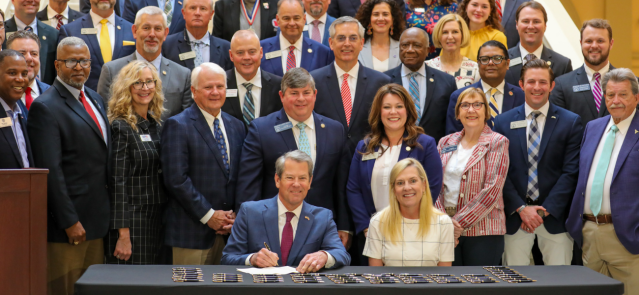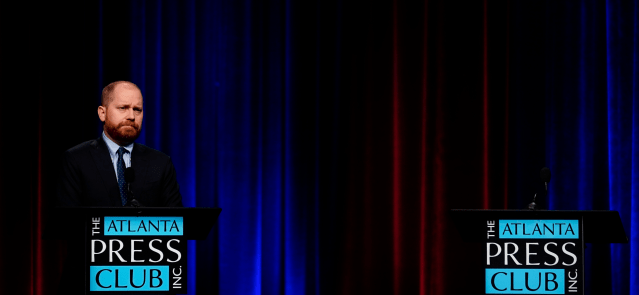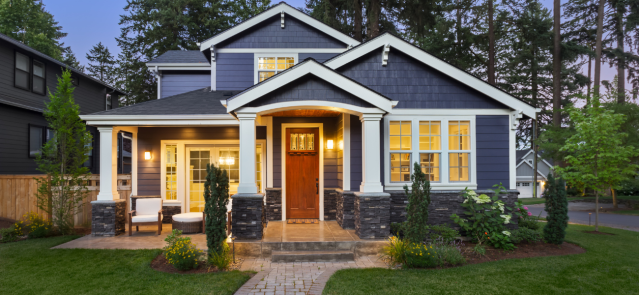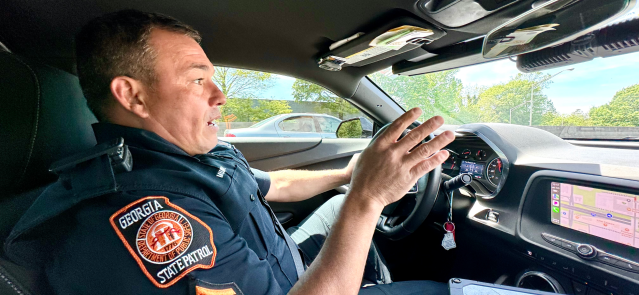Stay ahead of the curve as a political insider with deep policy analysis, daily briefings and policy-shaping tools.
Request a DemoClosures, reversions put Georgia charter schools to the test
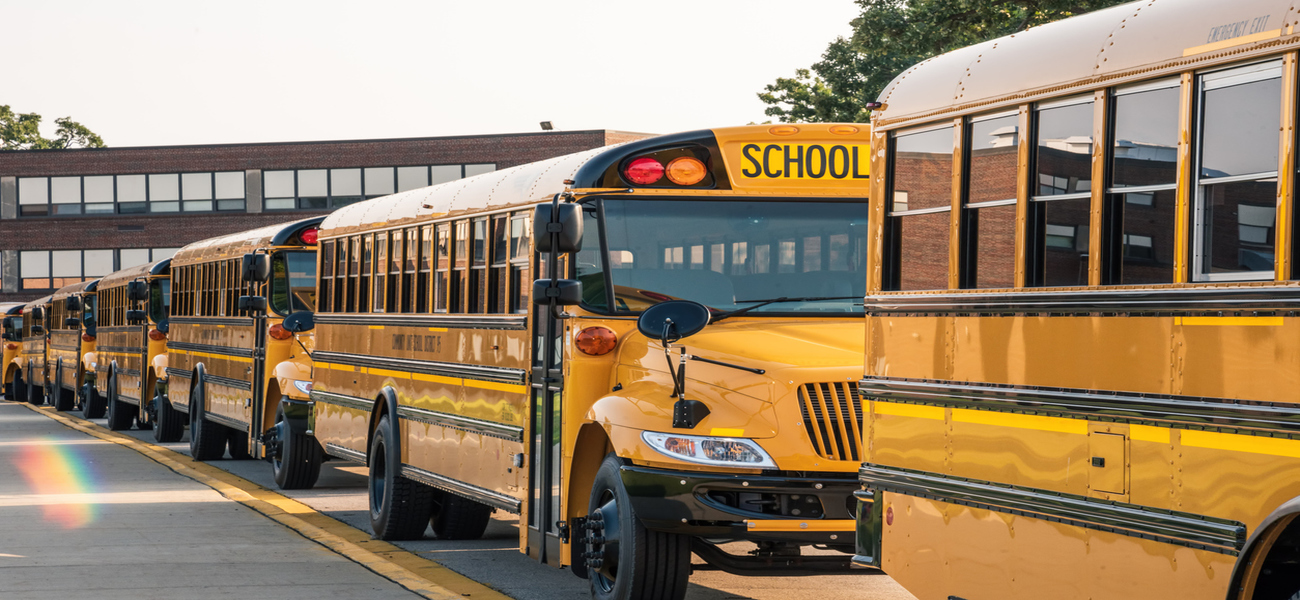
Credit: iStock
- Nearly 42% of Georgia charter schools closed or reverted to traditional public districts.
- Roughly 1 in 26 Georgia students enrolled in charter schools in spring 2021.
- Academic progress promising for most charter schools.
Michele Neely knew nothing about charter schools when she set out to find a less regimented, less test-focused school for her children. She found the right fit at the International Charter School of Atlanta, a north Fulton County charter school that had a more relaxed attitude on test scores and offered classes in more than just English as a dual-language immersion program.
The experience was so worthwhile that once her kids aged out of the K-8 school, Neely hopped on the charter-school bandwagon and became president of the nonprofit State Charter Schools Foundation of Georgia.
“I was frustrated with everything being such a traditional approach,” Neely said of traditional public K-12 schools in a recent interview. “A school is so much more than just their (test scores) and their ranking.”
However, while Neely’s kids’ charter school has stayed open since 2015, dozens of other charters in Georgia have either closed or reverted to traditional public schools since 2009, according to an analysis of state data by State Affairs.
Meanwhile, dozens more charter schools have also opened during that time, many of which show promising trends in boosting academic progress for some of Georgia’s roughly 150,000 students at chronically low-performing schools. That track record paints a curious picture for the staying power of Georgia’s charter schools, particularly once the COVID-19 pandemic ends and many parents rethink where they want to send their kids to school.
“Our charters are really incubators for innovation,” Neely said. “If they see they need to make adjustments, they can quickly pivot and be very responsive to the community.”
Those less confident in charter schools see the high closure and reversion rate as evidence the charter model only offers better educational options on paper, but falls short when it comes to actually delivering a better school experience for lower-performing students.
“Charter schools have not been the panacea that some folks claim them to be,” said Jimmy Stokes, a retired Georgia educator and former executive director of the Georgia Association of Educational Leaders.
“They thought this was going to be a marvelous invention of schooling that would result in academic achievement," he said. "And it hasn’t.”
- Learn more about the money challenges Georgia faces when it comes to improving struggling schools in our Explainer story, "Money, Poverty and the Pitfalls of Georgia's Public Schools."
Charters open, charters close
Compared to traditional public schools, Georgia’s charter school system is still in its adolescence. The first charter schools sprang up in the mid-1990s and grew quickly in number over the next decade – even as many new schools also quickly changed course.
Between 1993 and 2005, more than 40% of the 65 charter schools that were approved to open either closed or returned to operating as traditional public schools, according to a state Department of Education (DOE) report. That rate didn’t change much over the next decade or so.
According to State Affairs’ analysis of DOE documents, nearly 42% of charter schools in Georgia have closed or transitioned back to traditional public schools or magnet and international baccalaureate (IB) models since the 2008-09 school year. That has left more than 41,000 students to find new schools or have their former charter schools come under the management umbrella of local districts. Most switched back to public schools and pressed on as they were before becoming charters, the DOE documents show.
Some students continued classes at Georgia’s college and career academies, many of which hold charters but were excluded from State Affairs’ analysis since they operate under different educational models.
In all, 74 charter schools were verified as having closed or reverted to traditional public schools between 2008 and 2021, using the DOE documents, state annual performance reports, state student enrollment records, the National Center for Education Statistics’ public-school database and local news reports.
- Learn more about how many charter schools in Georgia don't have the same access to local tax dollars as their traditional public-school counterparts in our Explainer story, "Tax-Dollar Tensions Strain Local Charter Schools in Georgia."
Despite those figures, Georgia has still managed to keep tens of thousands of students enrolled in charter schools over the years. As of March 2021, roughly 1 in 26 students out of Georgia’s total population of about 1.7 million students were enrolled in 93 charter schools, rounding out to more roughly 67,000 charter students. That’s more than triple the roughly 22,000 students enrolled in state-funded charter schools 15 years ago, when the then-new education model took root in Georgia and began expanding rapidly, according to state data.
Dozens of new schools have opened since then, boosting Georgia’s count of charter schools at the same time as many other schools have dropped off the charter map. At the same time, vast numbers of Georgia students now fall under so-called “charter systems,” in which entire local school districts sign agreements with the state to waive certain administrative rules in return for tighter state scrutiny.
While charter systems have come to include the large Atlanta Public Schools and Fulton County Schools, most schools in these systems are still traditional public schools. But put together, recent state data shows around one-fourth of all students in the state are now under some form of a charter arrangement, be it via an individual school or a wider system.

Wheat from the chaff
Whether the closures or switch to public schools is a good or bad historical trend depends on whom you ask.
Supporters of charter schools actually consider some closures to be a good thing, proving that the model works as intended by weeding out schools that lag behind on academic progress or fail to muster financial viability. It all boils down to how charter schools are supposed to work, supporters say.
“If you don’t ever see charter schools close, then that means it might not be working,” said Lauren Holcomb, executive director of the State Charter Schools Commission.
There are several types of charter schools in Georgia, each different depending on whether they have contractual ties with the state or with local school districts. About 60% of charter schools contract with local districts, while the rest contract with the state. Either way, charter schools exist through state or local agreements that let them teach different subjects than traditional public schools, follow alternative student schedules and loosen rules on teacher qualifications – but in return, they face stricter academic standards.
The ability for state or local officials to yank a school’s charter for poor academic performance or money management is one of the ways state and local education officials can hold charter schools’ feet to the fire if student achievement stumbles, Holcomb said.

“It is absolutely our job to close poor-performing schools,” Holcomb said in a recent interview. “If they don’t have that track record of out-performing (traditional public schools), we’ll ask if they should continue to exist.”
Several charter schools with internal management issues or little student progress have shuttered in Atlanta and surrounding suburbs in recent years, prompting a rush for parents to find new schools for their kids, according to state data and local news reports. Many of those schools like Ivy Preparatory Young Men's Leadership Academy in Atlanta and Kennesaw Charter Science and Math Academy in Cobb County lasted several years before closing, records show. Some, such as Macon Charter Academy in Bibb County, saw steep declines in enrollment before closing. Others including the state’s first virtual school, Graduation Achievement Charter High School, had large student enrollment upon closure.
Many more charter schools over the past decade have returned to traditional public K-12 districts or carried on with different alternative-school models like IB programs, such as the high-performing Gwinnett School of Advanced Mathematics, Science and Technology in Gwinnett County. Typically, schools that lose or give up their charters have help from local officials to relocate students, while many schools simply continue under the umbrella of their local district. But in some cases, parents and students are left in the lurch.
“I can’t remember a single (closure) where the parents were happy about it,” said Tony Roberts, the president and CEO of the nonprofit Georgia Charter Schools Association. “It’s heart-wrenching.”
Over the past 15 years, Roberts said he’s seen low-performing charter schools close that needed to close rather than “trap kids in another school that’s going to fail them.” He acknowledges it can be risky for parents to enroll their kids in newer, less established charter schools. Still, Roberts has faith in the charter model as a good alternative to keeping students in struggling traditional schools – so long as parents do their research first.
“The charter school has held up the promise and still can be an oasis for those parents who feel like they have no choice,” Roberts said. “Parents can mitigate the risk by looking very carefully at the school. They really need to do some due diligence.”
Test results show promise
Despite some setbacks, supporters see positive trends in test scores and graduation rates compared to many traditional public schools – a key reason for the creation of charter schools in the first place.
After years of halting demographic growth, Georgia’s charter schools began seeing more students from minority and low-income backgrounds enroll in the mid-2000s. Student populations at charter schools show largely the same share of kids from low-income families who qualify for free or reduced lunches. More Black students are also enrolled in charter schools than the state average, according to a 2020 state report.
Backers point to certain positive trends in test scores and overall academic experiences for many charter schools as proof the charter model has merit.
For example, most of the 84 charter schools for which the state logged performance data in 2018 beat out the state or their local district average in terms of how well students learned subjects like math and reading according to their grade levels, a state report shows. Even more of those 84 charter schools – nearly two-thirds total – saw students make progress year-over-year in their courses during the 2017-18 school year compared to students with similar academic track records in neighboring public schools, according to the report.
Charter advocates also highlight better performance among many charter schools on certain national tests, including the National Assessment of Educational Progress tests. Additionally, Georgia State University researchers found in a 2018 state-commissioned report that charter schools tend to boost students’ graduation rates and college attendance, despite instances of mixed test results for some schools.
Put together, the testing and progress data help fuel charter-school backers’ confidence that parents and students in Georgia’s most struggling schools can find a better option in the charter model.
“The numbers are reflecting that overwhelmingly, the students are better off in the charter schools than the public schools that they’re zoned for,” said Buzz Brockway, a former state lawmaker from Gwinnett County who currently chairs the state charter commission.
“(Parents) don’t want their zip code to dictate their child’s future,” he added. “A charter school is a school of choice, essentially.”
Amid that optimism, charter schools have drawn a solid dose of skepticism and opposition from many local education advocates. Critics are quick to point out that charter schools’ test scores are very much mixed when it comes to hard-and-fast results compared to traditional public schools.
For example, out of the 84 charter schools surveyed for test results in 2018, less than half notched baseline scores and performance ratings higher than the state average or compared to nearby traditional schools. That gray area gives some local education advocates pause. As it stands now, many critics view charter schools as another schooling option that has good and bad elements, but which has not yet emerged as a major solution to Georgia’s challenges with low-performing schools.
“You’ve got to make sure that what you choose is better than what you’ve got,” said Stokes, formerly of the state educational leaders’ association. “Just choosing something different, choosing something glitzier, doesn’t mean it’s going to be better.”
- Read about how a state-funded program to help improve Georgia's struggling schools collapsed in less than three years in our story, "How Politics Doomed a Struggling-Schools Program in Georgia."
Chartering a better future
The jury is still out on what the future holds for charter schools as Georgia’s entire education system looks to rebound from the COVID-19 pandemic. State officials like Holcomb and Brockway anticipate a bright future ahead for charter schools, particularly after many charter schools already had alternative class schedules and online-learning tools in place that helped them weather the pandemic, supporters say.

Brockway expects that parents looking for a post-pandemic change in their kids’ school or to continue with virtual classes may gravitate toward charter schools as an option going forward.
“Not only will this trend continue, I think it’s going to accelerate,” Brockway said in a recent interview. “Parents want more for their kids, and the education system will have to respond.”
He would like to see more charter schools open outside the metro Atlanta and Savannah metropolitan areas, where data shows more than 20% of the state’s charters are located. Whether the gates open for more charter schools may depend on local school districts’ appetite to contract with them and share a piece of their local tax revenues, advocates say. Currently, state law does not require charter schools to receive local property and education taxes.
That tension over money might dampen prospects for more charters to open into the future, particularly since the state has limited funding to contract directly with charters, advocates say.
“There’s a real fear (with local school districts) that they’ve got to cling to every single dollar they’ve got,” Brockway said. “I think it would behoove local school districts to embrace this change and embrace charter schools.”
Critics have long worried that charter schools take away dollars from already tight-budget traditional public schools, particularly those in minority and low-income communities that have struggled for years. Locating some charter schools in more affluent areas where students already have high scores also gives the impression that the model is geared less toward helping low-performing schools than backers make it out to be, according to some critics.
“The push for charter schools comes from those who would prefer that public education for all students no longer exist,” said Lisa Morgan, president of the Georgia Association of Educators. “It is an anti-public education movement.”
For critics like Stokes, the future of Georgia’s charter schools looms like a big question mark. Stokes said he wouldn’t be surprised if even more schools close in the coming years should it become clear – as he expects it will – that they’re “not able to cut the mustard academically.”
“I think they’ve plateaued,” Stokes said. “Charters, they’re neither hot nor cold, as far as I’m concerned. They’re just there.”
What else would you like to know about Georgia's public schools? Share your thoughts/tips by emailing investigative reporters Tammy Joyner at [email protected] and Jill Jordan Sieder at [email protected].
Read this story for free.
Create AccountRead this story for free
By submitting your information, you agree to the Terms of Service and acknowledge our Privacy Policy.
Kemp signs bills on education, health care, taxes
Gov. Brian Kemp signed a slew of bills over the past week or so, including the private school voucher bill long sought by Republicans and a bill that will ease regulations over the construction and expansion of medical facilities in rural areas. His bill-signing events were clustered into themes: education, health care, military members, human …
Incumbent candidates for local, federal races likely to be no-shows at this weekend’s primary debates
ATLANTA — One of Georgia’s prominent media organizations is pleading with incumbent state and congressional candidates to participate in its primary election debates slated for Sunday.
For the first time in The Atlanta Press Club’s 30-year debate history, incumbents facing challengers in the May 21 primary have either declined or not yet committed to participating in the organization’s well-known debate series. The possible no-shows include candidates in four Congressional races as well as the Georgia Supreme Court, and the Fulton County District Attorney races.
“This is the first time that we’ve had so many [incumbents] not participate,” debate organizer Lauri Strauss told State Affairs. Strauss declined to speculate why candidates aren’t participating.
Hoping to encourage more participation, the organization issued the following statement:
“The Atlanta Press Club believes it is the responsibility of people running for public office to answer questions from their local media that will help inform voters before they cast their ballots. If a candidate is running for public office, the candidate should be willing to participate in the democratic process, which includes attending debates and fielding questions from journalists and opponents.”
Candidates have until Friday to RSVP.
Strauss said candidates who fail to appear will be represented on stage by an empty podium during the debate.
District Attorney Fani Willis has declined to participate and Democratic U.S. Reps. Lucy McBath and David Scott have yet to RSVP. Strauss said the organization is still in talks with Georgia Supreme Court Justice Andrew Pinson’s staff about his appearance in the debate.
Willis, declined earlier this week to participate, citing constraints around talking about sensitive cases like the criminal prosecution of former President Donald Trump.
McBath currently represents the 7th Congressional District and is now running in the newly drawn 6th Congressional District against two Democratic challengers, Jerica Richardson and Mandisha Thomas. McBath declined to participate in the press club’s general election debate in 2022, forcing her Republican challenger Mark Gonsalves to debate with an empty podium. McBath won with 61% of the vote.
The debates will air live on April 28 on GPB.org, on The Atlanta Press Club’s Facebook page (www.fb.com/TheAtlantaPressClub). It will be rebroadcast in early May on WABE.org.
| Race | Tape and Livestream Sun. April 28 |
GPB-TV Broadcast | WABE Broadcast |
| Congressional District 6 Democrats | 10:00 a.m. | April 29 at 7:00 p.m. | May 1 at 4:30 p.m. |
| Congressional District 13 Democrats | 11:15 a.m. | April 28 at 4:00 p.m. | May 1 at 5 p.m. |
| Congressional District 3 Republicans | 1:00 p.m. | April 28 at 5:00 p.m. | May 2 at 3:30 p.m. |
| Congressional District 2 Republicans | 3:00 p.m. | April 29 at 5:00 p.m. | |
| Georgia Supreme Court | 4:45 p.m. | May 2 at 4:30 p.m. | |
| DeKalb County CEO | 5:45 p.m. | May 2 at 5:15 p.m. | |
| Fulton County District Attorney | 6:45 p.m. | May 1 at 4 p.m. |
Have questions or comments? Contact Jill Jordan Sieder on X @journalistajill or at [email protected] and Tammy Joyner on X @lvjoyner or at [email protected].
And subscribe to State Affairs so you do not miss an update.
X @StateAffairsGA
Instagram@StateAffairsGA
Facebook @StateAffairsGA
LinkedIn @StateAffairs
‘It is nothing short of insane:’ Bill to criminalize squatting signed by governor
ATLANTA — Today Gov. Brian Kemp signed legislation criminalizing squatting, the illegal practice of entering and residing on someone else’s property without their consent. The Georgia Squatter Reform Act makes squatting a misdemeanor criminal offense, punishable by up to a year in jail, a $1,000 fine, or both. It also speeds up the timeline to …
State troopers are stretched to fight drugs and curb highway deaths
ATLANTA — When Cpl. Anthony Munoz straps on his bullet-proof vest each day and pulls out of the Department of Public Safety headquarters in Atlanta, Munoz never knows how his shift will unfold. What is for certain is that the traffic — of cars, criminals and contraband — is constant. And what is also true …

